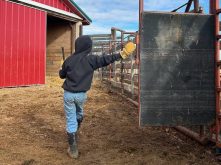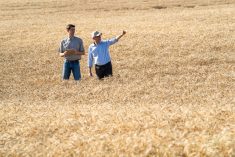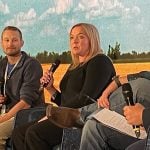Is equalization a succession issue on your farm?
Treating farming and non-farming children equally has been a source of conflict for farm families for years.
With the rising valuations in farmland and farm machinery and the potential for future increases, many farm families are struggling even more with the topic of how to treat children equally in their estate and succession plan.
The easy decision for senior farmers of days gone by was to leave equal company shares or parcels of land to all their children. I feel no need to repeat the well-known horror stories this has caused for the farming child, and the subsequent destruction of many family farms.
Read Also

Avoid these thought traps when investing
Investing for Fun and Profit: Let’s review a list, by renowned fund manager Peter Lynch, of the most dangerous things that stock market investors can say to themselves, or to others.
More recently, the method used was to leave the farm to the farming child and the residue of the estate to the non-farming children. This solved the previous issue, but has basically also been rendered inappropriate. With rising farm values, the residue of the senior farmer’s estate is rarely significant enough to equal the value of the land, machinery and other assets given to the farming child.
Succession “equality” can be the elephant in the room at family gatherings. Senior farmers who made a plan when land and machinery values were lower and are assuming this plan is still okay with all of their children because nothing has been said, are likely wrong. Even if their non-farming children have not raised the issue, a discussion is likely happening between non-farming children and their spouses and possibly among the non-farming siblings too.
Regular reviews of current succession and estate plans are important. In addition to issues caused by the increasing value of farm assets, there are also ever-changing tax laws and jurisdictional changes to marital property acts and wills and succession legislation.
Time for a review
When reconsidering the issue of fairness among siblings, you may find yourself generally reviewing your succession plan, and needing to write new documents across the board. This is good. It will ensure your plans match your intentions and eliminate potential conflict generated by out-dated documents.
Simply including children on land titles is becoming popular with farmers planning succession, but this solution has some implications you may not like. When on title, children who experience credit issues or have marriage problems can invite challenges to the farmland ownership. This can force the sale of property, borrowing against it or putting estranged spouses on title to settle the claim.
Also, using the land for collateral in the future will require all owners to sign documents. Non-farming siblings could make things very difficult for the active farmer, given that they must all agree to the plan.
Putting the farming child on the land titles may make the most sense, but protect the asset with proper legal advice and drafted documents. Spouses cannot be left in the cold and documents that conflict with the marital properties acts will be unwound in a hurry.
Using farmland to equalize inheritance values between farming and non-farming children can be done if documents are properly drafted and signed. Make sure to include long-term lease or rental restrictions that ensure access to the land by the farming child. Binding agreements can flow from the senior farmer to beneficiaries, offering certainty to the farming child.
These documents would be joint venture agreements with extensive details for triggering events and privileges. Requiring a third-party calculation for fair rental rates will help ensure certainty for both the farming child and the non-farming siblings.
I’ve been talking about personally-held land. When farmland is held in a farming corporation things change. Corporately-held assets can often offer even more protection and certainty. Corporations can draft and sign shareholders agreements that deal in detail with events like, death, disability, disagreement, divorce, exit strategies and the asset valuation process.
In either case the intent is clear: to be fair to all of the children, yet maintain the integrity of the farm.
A farm planning specialist and specialist lawyer are important to help you through this process. This is not a DIY situation.















